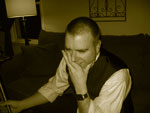Peak(ed)
Michael Dean Clark
(The first in a series on my attempt to hike to the top of the tallest peak in the continental United States.)
On top of Mt. Whitney is a stone hut erected in 1909 to protect hikers from the elements should they be stranded on the peak. This is the highest building in America, something I only know because I’ve seen pictures of it. But that was supposed to change when I joined six friends with the express purpose of hiking to the top of Whitney, striking a pose next to the hut, and fulfilling a life-long goal.
I failed. It sucks.
I’m tempted to justify that statement, maybe deflect a bit. I did make it to 12,100 feet above sea level, which is 700 feet higher than I’ve ever hiked. I wasn’t quite in the shape I wanted to be for very legit reasons. I came down with a decent case of altitude sickness. The night before we hit the trail, snow dumped on what was already the most difficult and dangerous section of the hike. I am extremely afraid of heights and falling from them. I’m getting older.
All of these factors were in play and impacted my trip. But it’s simply more accurate to say I failed.
I think right now I’m supposed to add, “but it was a good failure.” I’m not going to. This isn’t one of those lessons learned deals, unless that lesson is that failure blows and disappointment lingers. I assume most of us don’t need to be reminded of that, let alone think about it while they watch three guys from their group reach the summit without them.
I should note that I am really happy my friends made it, and not in that Miss America Runner-up way. In fact, I think I’m happier for them than I would have been had I made it myself. The sting of imagining how great it was up there – something my fiction-generating mind does quite vividly – makes me appreciate their accomplishment even more.
It’s lame but true. It’s also true that my trip to the foot of Whitney was an amazingly good time. I spent time with two of my closest friends, guys I definitely don’t see often enough. We talked deeply and joked shallowly and hiked the hill together. And when the thin air made my head hurt so bad I thought I was going to vomit every time I moved, they skipped the summit and hiked down with me to make sure I didn’t fall off the mountain.
I guess this is the spot where I should write “so, without my failure I wouldn’t have…” fill in the appropriate friendship platitude. But I won’t do that either.
It sucks that, in a way, my failure cost them the chance to finish what they started. But my guilt is what allows me to feel the grace they extended me on the mountain. It’s what enables me to hear and believe them when they say the time spent with me was worth their own disappointment in not summiting.
Maybe I can trust them because we all share the same failure together.
I find it no coincidence that while I sat reading in the airport on the way home, Flannery O’Connor’s words spoke directly to my failure and its necessity.
“(The writer) begins to see in the depths of himself, and it seems to me that his position there rests on what must certainly be the bedrock of all human experience – the experience of limitation or, if you will, poverty.”
And, in case I started feeling the urge to make a moral out of the mountain, she said this.
“The writer’s business is to contemplate experience, not to be merged in it….you can’t make an inadequate dramatic action complete by putting a statement of meaning on the end of it...”
Michael Dean Clark holds a PhD in English from the University of Wisconsin-Milwaukee and is an assistant professor of writing at Point Loma Nazarene University in San Diego, California. His latest authorial activity is going through his pile of rejection letters and rating them on a scale of painfulness and sarcasm.
